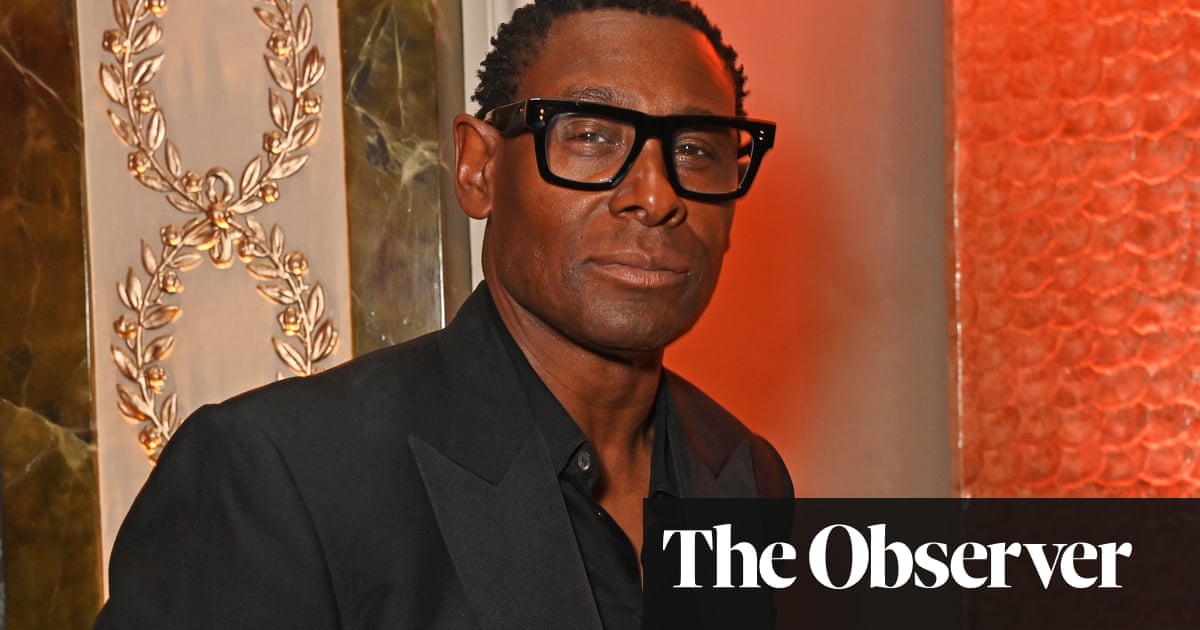
Ricardo P Lloyd was nervous as he stepped into the plush offices of a major British talent agent. The agent, who is white, represents stars across British TV drama. “You feel like if you impress this person, your life could change,” says Lloyd.
Then 25, he was used to reading for small “gang roles” but Lloyd was hot after a successful run in a special birthday celebration of Shakespeare at Westminster Abbey (the production starred Mark Rylance and was described by Michael Billington as “one of the most moving celebrations of Shakespeare I’ve experienced”).
“Diversity is the new thing,” said the suited agent, by way of greeting his potential client. It was an “automatic red flag”, Lloyd says, but he gamely sent over a few tapes. His rejection came with a cursory “we’ve already got someone who looks like you on our books”. Lloyd felt foolish to think it was his talent, rather than the colour of his skin, that got him in the room. Recounting the story, his big eyes are wet with tears: “Every actor feels like they’re not good enough but deep down I know there’s still a barrier to me being accepted … The industry keeps shutting me out, but I will find a way to do what I love.”
Ricardo P Lloyd (the P stands for Paris) is sitting on a bench in London’s Queen’s Park. He grew up in nearby Kensal Rise. It is now an affluent residential area, but 20 years ago the area was rife with gangs, guns and crack cocaine. It was drama that would provide his way out. “It started as escapism for me,” he says of his starring roles in school productions of Bugsy Malone and West Side Story.
For five years it was his job, too. But work was inconsistent, a problem he exacerbated by turning down many of the typecast roles that came his way. “I’ve got two degrees, I’ve done Shakespeare, but I’m still the roadman saying: ‘Man’s gonna stab you up” with a spliff in my mouth,” he says.
Now, approaching 30, Lloyd says he needs to know where his next pay cheque is coming from. Indeed, lockdown could not have come at a worse time, after a period of near-misses (including callbacks for major Amazon Prime and BBC dramas). Unable to find work, Lloyd was broke and, shortly after, homeless. “That’s when the depression came,” he says.
It is not only up-and-coming actors such as Lloyd who struggle to find work on screen in the UK. David Harewood is 55 and one of the most successful Black actors Britain has ever produced. “I’ve never played a leading character on British television,” he says. Born in Small Heath, Birmingham, Harewood won a place at the Royal Academy of Dramatic Art (Rada) at 18. In 1997, he became the first Black actor to play Othello at the National Theatre in London. Best known for playing the CIA counter-terrorism director David Estes in Homeland – which routinely drew more than 2 million viewers on Channel 4 – Harewood is now a bestselling author after the publication of his memoir, a rumination on the racial abuse he suffered and the psychosis it fuelled.
Throughout the book, Harewood is glowing about his time at Rada and says he was “very lucky” to have had a principal who was intent on “moving away from the model of a pretty blonde person”. But the industry was not so progressive and Harewood struggled for onscreen roles. “I had to come to terms with the fact that I was not going to play strong, authoritative characters. That plays directly into your mental health because you know something’s not right,” he says. “The path to global recognition is clearer than the path to national recognition. Here, we’re still dealing with people’s perceptions of what Black can be.” Other British actors who have had to head to the other side of the Atlantic to find success include the Academy award winner Daniel Kaluuya, Idris Elba and Bridgerton’s Regé-Jean Page.
While Weathers read a scene from the Noel Clarke film Adulthood, one of his tutors commented on how he would have no trouble sourcing props. “He told me: ‘I’m sure you could get a gun,’” he says. He adds that “it became a big joke … being constantly confused for the only other Black person in my year”.
A survey of soap actors by the diversity and inclusion consultancy Inc Arts UK found that 16% had been mistaken for another Black person on set, while 54% reported that they never get mistaken for someone else as they are “normally the only Black person on set”.
Many young Black actors cannot afford to attend drama school in the first place. Undergraduate fees currently stand at £9,250 a year before living expenses. Mascuud Dahir, 22, turned down a place at London’s Central School of Speech and Drama (Central) this year after failing to raise the £69,000 required for him to complete the three-year course. “I feel a bit put off for the time being but I’m not ready to give up,” he says. Like Lloyd, Dahir attended Intermission Youth Theatre, an arts charity patronised by Naomie Harris; Rylance is also on the board of trustees. “It’s not just about money,” says Lloyd. “I didn’t have the knowledge or connections to know about drama school.”
To a young person of colour, a prestigious reference on their CV can make all the difference. But the recent controversies rocking UK drama schools reflect the fact that, for years, these institutions have acted as a gatekeeper to all but the token few Black and Asian faces who possess undeniable levels of wealth or talent.
“It took a man to die halfway across the world for people in Britain to realise racism is a thing,” says the actor Reice Weathers, 28. He grew up in Islington and went to Laycock primary school, now the base of Make Believe, his performing arts school for children. After graduating with a BA in acting from Central in 2015, Weathers found himself back there last year, in heated discussion with the school’s hierarchy over allegations it had failed its students of colour. “There was “a lot of virtue signalling from companies and brands that gaslit people for years. Central was no different,” he says.
Professor Gavin Henderson resigned last year as the principal of Central School of Speech and Drama, after apologising for “the lived experiences of students of colour” at the school. He had earlier dismissed the idea of implementing access quotas by saying: “We have a school to maintain and a reputation to maintain in terms of the standards of who we are engaging.”When Weathers arrived at Central in 2012 and saw the third-year acting shows (the public showcase for the graduating class) he noticed that “all the Black and brown people were playing butlers and servants”.
Weathers estimates that he is in more than £40K of debt from his time at Central. “I was taught how to speak RP or northern or a Black Country accent but I was never taught Jamaican or African accents that I’d be more likely to need in the industry … Everyone pays the same but they don’t receive the same amount of training.”
Rada has also come under scrutiny over issues around race. Last year, students sent an open letter calling for the name of Irish playwright George Bernard Shaw to be dropped from its theatre due to his views on eugenics, and also implored Rada to stop performing Restoration comedies due to their association with Empire-building. Rada released a statement saying it was “committed to supporting all Black students” but acknowledged “there is work we must do”, after a former student said she was told “there are no Black playwrights, we can’t teach you that, they don’t exist”, by a tutor.
Inc Arts UK’s CEO, Amanda Parker, says the role of drama schools in shaping the wider industry, for better and worse, cannot be overstated: “They have a duty of care to ensure that all emerging talent is supported at every stage. Hasty casting decisions, a lack of care about how sensitive subjects are tackled on stage, a lack of support from someone else who understands their lived perspective: drama schools must be mindful of how these shortcomings can add up to significant barriers to an actor’s career.”
Ian Manborde, Equalities and Diversity Officer at the performing arts workers’ union Equity says: “the day-to-day working lives” of the union’s black and Asian members are “distinguished by an experience of casual, systemic racism. This racism excludes them from and limits their opportunities in the sector, and leads to stereotypical and racist portrayals in art.””
“I’ve never felt intimidated, being the only Black person in the room,” says David Harewood. “But it’s hard to speak up because the minute you do, you’re a troublemaker. There are so many hierarchical lines that Black people have to tread in order to keep their fucking jobs.”
At drama school level at least, it’s all change at the top. Henderson was replaced as principal at Central in February by Josette Bushell-Mingo, the former head of acting at Stockholm University of the Arts, Sweden. Bushell-Mingo was born in London to Guyanese parents and trained at the RSC. She is the first Black head of Central in its history and the school’s first female head since 1942.
Pamela Jikiemi, head of film, television and radio at Rada since September 2019, says: “Drama schools are very much held in a chokehold by the white establishment … When you’re white you get actor training, when you’re Black you get training to be white.” She says that Rada has sought to address the big picture in order to tackle the longstanding issues at the school. Following the formation of a steering group on racial equality in July 2020, Rada has hired a consultant, Prof Vini Lander, to oversee the organisation’s work on race.
“We’ve had to outline: this is what racism looks like, this is what protected characteristics are. This is what you need to address in the curriculum,” says Jikiemi. “There’s no point just saying: ‘We’ll take that play out and put a Black one in’.” She adds: “My dad used to say if you’re going to eat a frog, eat a fat one.”
Since the pandemic hit, there have been no sofa receptions with high-profile agents for Lloyd. For much of the past two years, he has claimed universal credit. “I’ve questioned my acting, my identity, my purpose. Imagine working with Mark Rylance and being homeless a year later?”
Lloyd says he is slowly building his life back. There have been some Zoom calls with a couple of Hollywood agents. “I’m still fighting to get through the door in my country, but coming from north-west London and speaking the way I speak, it can feel like the industry’s against you. It’s classism as well as racism.”
“Things are starting to change,” he adds. “There might be a Black James Bond soon but as long as the structural system remains … it’s just tokenism.”












